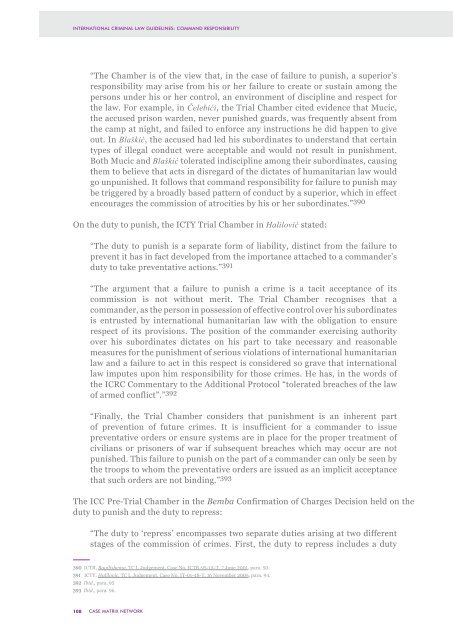Command Responsibility
CMN_ICL_Guidelines_Command_Responsibility_En
CMN_ICL_Guidelines_Command_Responsibility_En
You also want an ePaper? Increase the reach of your titles
YUMPU automatically turns print PDFs into web optimized ePapers that Google loves.
INTERNATIONAL CRIMINAL LAW GUIDELINES: COMMAND RESPONSIBILITY<br />
“The Chamber is of the view that, in the case of failure to punish, a superior’s<br />
responsibility may arise from his or her failure to create or sustain among the<br />
persons under his or her control, an environment of discipline and respect for<br />
the law. For example, in Čelebići, the Trial Chamber cited evidence that Mucic,<br />
the accused prison warden, never punished guards, was frequently absent from<br />
the camp at night, and failed to enforce any instructions he did happen to give<br />
out. In Blaškić, the accused had led his subordinates to understand that certain<br />
types of illegal conduct were acceptable and would not result in punishment.<br />
Both Mucic and Blaškić tolerated indiscipline among their subordinates, causing<br />
them to believe that acts in disregard of the dictates of humanitarian law would<br />
go unpunished. It follows that command responsibility for failure to punish may<br />
be triggered by a broadly based pattern of conduct by a superior, which in effect<br />
encourages the commission of atrocities by his or her subordinates.” 390<br />
On the duty to punish, the ICTY Trial Chamber in Halilović stated:<br />
“The duty to punish is a separate form of liability, distinct from the failure to<br />
prevent it has in fact developed from the importance attached to a commander’s<br />
duty to take preventative actions.” 391<br />
“The argument that a failure to punish a crime is a tacit acceptance of its<br />
commission is not without merit. The Trial Chamber recognises that a<br />
commander, as the person in possession of effective control over his subordinates<br />
is entrusted by international humanitarian law with the obligation to ensure<br />
respect of its provisions. The position of the commander exercising authority<br />
over his subordinates dictates on his part to take necessary and reasonable<br />
measures for the punishment of serious violations of international humanitarian<br />
law and a failure to act in this respect is considered so grave that international<br />
law imputes upon him responsibility for those crimes. He has, in the words of<br />
the ICRC Commentary to the Additional Protocol “tolerated breaches of the law<br />
of armed conflict”.” 392<br />
“Finally, the Trial Chamber considers that punishment is an inherent part<br />
of prevention of future crimes. It is insufficient for a commander to issue<br />
preventative orders or ensure systems are in place for the proper treatment of<br />
civilians or prisoners of war if subsequent breaches which may occur are not<br />
punished. This failure to punish on the part of a commander can only be seen by<br />
the troops to whom the preventative orders are issued as an implicit acceptance<br />
that such orders are not binding.” 393<br />
The ICC Pre-Trial Chamber in the Bemba Confirmation of Charges Decision held on the<br />
duty to punish and the duty to repress:<br />
“The duty to ‘repress’ encompasses two separate duties arising at two different<br />
stages of the commission of crimes. First, the duty to repress includes a duty<br />
390 ICTR, Bagilishema, TC I, Judgement, Case No. ICTR-95-1A-T, 7 June 2001, para. 50.<br />
391 ICTY, Halilovic, TC I, Judgement, Case No. IT-01-48-T, 16 November 2005, para. 94.<br />
392 Ibid., para. 95<br />
393 Ibid., para. 96.<br />
108<br />
CASE MATRIX NETWORK


